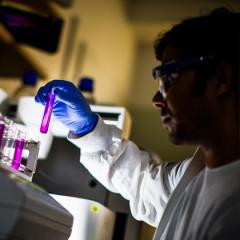Australian Institute for Bioengineering and Nanotechnology (AIBN) researchers will share in more than $2.3 million in new funding announced this week to advance medical initiatives.
The researchers, based at The University of Queensland, received grants from the National Health and Medical Research Council (NHMRC) this week.
Associate Professor Ernst Wolvetang will lead a project with AIBN colleague Associate Professor Christine Wells, using $756,000 to investigate gene networks that cause Alzheimer's disease in Down syndrome patients.
Using genome editing technology, the researchers will study specific adult stem cells called induced pluripotent stem cells with an additional chromosome 21, characteristic of people with Down syndrome.
Because Down syndrome is known to be linked to early onset of Alzheimer’s disease, researchers will determine if editing chromosome 21 can halt the onset.
A/Prof Wells has also secured funding as lead investigator, with $586,000 to determine the role of a protein called C-type lectin Mincle in cardiovascular disease.
Working with colleagues from UQ and Monash University, she aims to protect tissues in the heart and brain that are damaged during a stroke or heart attack.
The work involves examining the damage-causing pathways in inflammatory cells – and the ways of blocking Mincle to prevent its damaging influence.
Professor Justin Cooper-White will lead research to engineer an osteochondral tissue to repair cartilage defects using $423,000 in funding.
He will lead a team including UQ and Queensland University of Technology researchers aiming to assist the body in repairing cartilage defects resulting from sporting injuries or conditions such as osteoarthritis.
Stem cells derived from bone marrow are used to produce cartilage and bone “microtissues” of only 100 to 200 cells each.
The microtissues can be assembled into tissues suitable for cartilage defect repair and combined with scaffolds to ensure growth into the correct forms.
Early career researchers Dr Sophia Gu and Dr Amirali Popat each received Peter Doherty Biomedical Early Career Fellowships and $304,000 to further their work.
Dr Gu is using nanotechnology to develop a system for delivering medicines or genes to targeted sites where blood vessels have re-narrowed after angioplasty surgery.
Dr Popat aims to overcome side effects, lack of efficacy and drug dependence in treatments for inflammatory bowel diseases and colon cancer using intelligent nanoparticles with greater control over drug release and targeting.
The research will be conducted at the Mater Medical Research Institute, based at the new $350 million Translational Research Institute.


